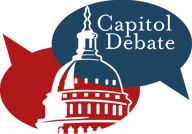Four Critical Skills That Will Help You Get Hired
The job market has never been more competitive these skills will help you stand out
There’s no question that students who practice debate in middle and high school tend to outperform their peers in terms of academic pursuits. From higher GPAs and standardized test scores to increased college acceptance rates, debate students have an edge on their competition.
Winning tournaments and getting into the college of a student’s choice aren’t the only considerations when thinking about joining a debate team. Debate prepares students with lifelong skills that they’ll use not just in school, but at work and in their personal endeavors.
Debate Experience Can Help Students Get Their Foot in the Door
In a recent Forbes article entitled, “How to Find the Millennials Who Will Lead Your Company,” writer Robert Sher -- a former debate student himself -- suggests hiring those who competed in speech and debate in high school. “[Debate students] all come dressed like business executives and they have a deep understanding of how to persuade, how to present clearly and how to connect with an audience,” he says. “It’s impressive.” Sher credits debate with his success as a CEO, speaker and consultant.
However, while having debate experience may help students score an interview, it’s not a guaranteed ticket to landing their dream job. Many CEOs and hiring managers would argue soft skills are just as important as a list of accomplishments.
Four Skills Employers Look For When Hiring
According to a 2014 LinkedIn study, here are four of the top skills employers are looking for when hiring entry-level employees (those with 0-3 years’ experience):
Problem solving
Sixty-five percent of hiring managers said a candidate’s ability to demonstrate their problem-solving abilities are important in the interview and hiring process.
“I look for individuals who are problem solvers,” says Gaurav Rekhi, head of product management at eBay. While your ability to digest and then react to issues and crises may be evident once you’re in a position, Rekhi recommends that candidates highlight their problem solving abilities in an interview by providing examples of how they’ve approached issues in the past, whether professional, academic or personal, as long as it’s relevant to the position.
According to Jeff Parcher, who authored a research report for the Philodemic Debate Society of Georgetown University, “typically forensics students engage in such complex thinking, regardless of the specific type of competitive event in which they are engaged. The development of these arguments requires (a) research, (b) organization and arrangement of information, (c) anticipation of what others might think about the same subject, and (d) evaluation of how to best use materials,” he says.
Quick learner
Do you learn new, complex tasks and ideas quickly? More than 60 percent of hiring managers want to bring people who are quick studies on board.
Debaters learn to be quick on their feet, which helps to facilitate their ability to learn and process new information with ease. The research is in favor of debate experience as well:
Carl Wiema, a Nobel-Prize winning physicist and professor, argues that debate is the best way to improve learning. He says debating leads to “substantially greater learning gains than are achieved with traditional lectures, with typical increases of 50 to 100 percent.”
So chances are, if a student learns to debate, he or she will also learn new concepts quickly.
Strong Communicator
According to the LinkedIn study, more hiring managers value oral communication over written communication skills, but both are important when it comes to landing a job and upward mobility in the workplace.
Bracken Darrell, CEO of Silicon Valley-based Logitech, places such high value on communication skills that he says he seeks out English majors when hiring.
"The older I get, the more I realize the power of words and the power of words in making you think ... the best CEOs and leaders are extremely good writers and have this ability to articulate and verbalize what they're thinking," Darrell says.
This is good news for debate students, who spend countless hours perfecting their written and oral communication and presentation skills during their time in debate practice and competitions.
Collaborative
Working well with others isn’t just for kids; employers want people who can not only think for themselves but also get the job done as part of a team. A 2012 IBM study revealed that 75 percent of CEOs regard collaboration as one of the key drivers of employee success.
Former Apple CEO Steve Jobs agreed. “You need to have a collaborative hiring process,” he said. “When we hire someone, even if they are going to be in marketing, I will have them talk to the design folks and the engineers.” And being able to ace this part of an interview is one of the keys to landing your dream job.
Collaboration is yet another area where debate students may have an edge over their peers. Thanks to months and often years of practice, they learn to thrive in team environments, setting the stage for successful careers.
